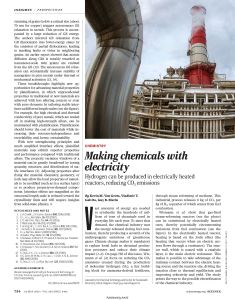Join getAbstract to access the summary!

Join getAbstract to access the summary!
Kevin M. Van Geem, Vladimir V. Galvita and Guy B. Marin
Making Chemicals with Electricity
Hydrogen can be produced in electrically heated reactors, reducing CO2 emissions
Science, 2019
What's inside?
More than a century after Edison, electrification is finally coming to the chemical industry.
Recommendation
From the 1880s through the early part of the twentieth century, almost every aspect of manufacturing was electrified. One outlier has been the chemical industry, which has relied on fossil fuels both as feedstocks and as an energy source in many of its processes. But change will be coming. Rather than a challenge, electrification of chemical synthesis is more of an opportunity to rethink and optimize methods that have not changed much in decades. The article will engage those looking to bring in a new age of clean, precise and compact chemical production.
Summary
About the Authors
Kevin M. Van Geem, Vladimir V. Galvita, and Guy B. Marin are professors at the Laboratory for Chemical Technology of Ghent University in the Netherlands.
















Comment on this summary